summer sessions, either as a student or to teach, and almost to a person, they have raved about the experience. In part has the enthusiasm seems to derive from the people gathered there for the summer sessions, in part it appears to come from the university's ethos and atmosphere, and in part it arises from the immediately evident charm of the beautiful city of Boulder (and for those who do get an opportunity get out and about, nearby
and the surrounding region).
I'd never been to Boulder or Naropa, however, so it was a pleasant surprise to be invited to participate in their
. I was particularly concerned about whether the reading, and the
taking place later in the week, were going to occur at all because of the terrible flooding that caused extensive damage in and around Boulder, but I was told that despite a few showers Naropa had made it through mostly unscathed, as did the
, where the Festival was being held, and all of the hotels where attendees would be staying, so the trip as of the weekend before remained on.
The Naropa reading was on
Tuesday evening, so I flew out that morning from
Newark, and, after a bit of finagling with
Delta Airlines, which had rescheduled me without notice for a flight that would have gotten me in too late, I reached Denver via a connecting flight from
Detroit with about a hour and a half to spare. No problem, right? I decided to take the
Super Shuttle from the Denver Airport, since it promised to drop me off right at the inn where I was staying. It did (and I do recommend Super Shuttle if you have
lots of time to spare), but I was the last one to reach my destination; we took detours through other surrounding cities and suburbs (
Erie, Louisville, Lafayette, etc.), such that I had to ask the driver, my voice rattling like a
guira, will you be able to get me to where I'm going by 7 pm? I think he pulled into the inn's driveway right at 7, and I quickly checked in, readied myself for the reading, and walked over to Naropa, which wasn't far away. But--and this is key for anyone who has not spent time in that part of the world--I immediately began to feel as if my entire body was composed of lead, and was sinking into the earth, because I am one of those people who suffers from
altitude disorders, at least on land. (Planes are not a problem.) So I had to collect myself before the reading, a slip of bark from
Allen Ginsberg's favorite tree helping (thank you,
Bhanu Kapil), and even while I was on stage I could feel the exhaustion kicking in, but I made it through and felt much better by the time the reception afterward started. Carmen and Laura both gave superb readings, and it was a tremendous honor to read with both of them after having read their work for years. It was also great to meet the
Naropa faculty, including
Michelle Naka Pierce, who extended the invitation, and many thanks to the wonderful
Arielle Goldberg, who was the point person coordinating the visit.
Fortunately I had a day to rest up and acclimate (it took two) before the &Now Festival began, on the campus of the University of Colorado. I had also heard about amazing prior versions of this conference, but seeing it up close, it felt like what the Associated Writing Programs conference would be if it were not so 1) institutionalized; 2) focused on mainstream writing and comprehensive; and 3) utterly interwoven with academe. I say this while noting that yes, &Now took place at a major public university and most of its participants are part of academe, but I got the feeling less of being of the university system than in it. Some of the writers I met made it quite clear they were not teaching and, at least for the time being, were not planning to. In any case, the focus was on writing, literature, creative work, play. It was refreshing to see a range of approaches to panel presentations and performances, which included but were not limited to--on my panel alone, organized and led by Tisa Bryant--improvisatory rapping and dancing (Ronaldo V. Wilson); a talk smartly invoking astronomy and physics (Lillian Bertram); a pre-recorded audio track, with more verbal play than a shelf of hiphop CDs (Doug Kearney); and a heartfelt, thoughtful discussion about teaching (Ruth Ellen Kocher). And we were one of the first panels of the conference, and the one that addressed the intersections of The Dark Room Collective, Cave Canem and The Black Took Collective (all connected by a colorful human Venn diagram).
There was a poets' theater/experimental play staged by 1913 Press that was quite provocative and inspiriting. There was another panel that included a fiction writer's on-the-spot transformation into a scarf-wearing medium; a Brazilian Yoruba-inspired Tarot reading; a conceptual art performance; a sharp paper bringing together magic and feminism; and a discussion of how creating an art book provided a means through writer's block. And on it continued, culminating, at least for me, since I had to return on Saturday (though the conference continued through that day), with a reading and Q&A involving two writers I have long revered, Percival Everett and Lynne Tillman. This kind of conference practice creates an environment in which the focus is on experiment, conversation, exchange. This is not to say that people were not struggling with all the usual anxieties that (American) academe and the (American) literary world induce, chief among them the issues of (any) jobs, publications, departments, tenure and promotions, and so forth. This is also not to say that the bugaboos of racism, sexism and misogyny, homophobia, classism, and so on also did not rear their heads, and in fact, at one reading, a poet (whom I know and did speak to about this right after the event finished) managed to combine the first two issues in spectacularly problematic fashion (you know how it is when someone is digging a hole and can't seem to stop himself). But there was much more going on, and even the people laying down rough patches appeared willing to discuss what they had done. That was a very positive aspect of the conference.
 |
Ruth Kocher, Lillian Bertram, Tisa Bryant, yours truly
(photo © Latasha N. Nevada Diggs) |
In general, the atmosphere felt far less like the usual conferences I go to, such as the Modern Language Association, the more-relaxed recently attended American Literature Association or MESEA (Society for for Multi-Ethnic Studies: Europe & the Americas) conferences, or the jam-packed AWP, all of which of course have their (important) value. Instead, &Now was much more like the sorts of community-based conferences I used to attend in my 20s, considerably more free-flowing and open and about literature itself, as opposed to the politics and power-plays of academe, bureaucracy, star systems, fame, money, and all the other things that are key elements our post-industrial, neoliberalist, horribly unequal capitalist, corporatized society. Or maybe those conferences--I'm thinking of the Celebration of Black Writing in Philadelphia, where I met the writers Kevin Powell and Major Jackson years ago and learned, sitting in the audience, that Nelson Mandela had been released from jail; or OutWrite, in Boston, which included and involved a large number of people not at anyone's university, not taking classes, but nevertheless writing, on panels and in conversations--were like the usual ones I attend, and I was too green and inattentive to notice.
At any rate, I had a great time, and by Friday morning, I was sufficiently grounded enough to walk to and from the campus from downtown Boulder twice (that day I registered 6.2 miles of walking on my phone pedometer), without falling out. I also walked around the downtown area of Boulder itself a bit, and as I note above, I was concerned about the city's physical state given the saddening post-flood images, but it appeared as though the CU campus and the downtown area, with the exception of a few spots, had not suffered extensive damage, though there were a number of repair crews dotting the landscape, and most of the locals I spoke with at both Naropa and the &Now Festival had also escaped the worst of the storm, though I believe I heard that the co-organizers of the Festival did lose quite a bit in the storm. The highlight of the Friday panels had an incredibly problematic title--"Colored Bitches in a White Boy's World"--and featured writers Carmen, Lilly Hoang, Jackie Wong, and Sandy Florian. While I was unable to catch the actual discussion (though I heard quite a bit about it), I did make it to their Q&A, where the exchanges were insightful, respectful, and, I think and hope, productive and generative for many people in the room. (That title, though!) In between the panels and readings, there was enjoyable meeting, listening, talking, sharing, thinking, amidst equally enjoyable bibulousness, which included a secret/semi-hidden bar, a longstanding dive, a colleague's lovely home, and a restaurant with a piano player (not a player piano) who was trying his best to deafen everyone present.
Many thanks to the organizers and all the participants. The next &Now Festival will take place in 2015, on the campus of California Institute of the Arts, in
. I hope to be there. Here are some photos from the event. If I can post one of the videos I'll do that too! Enjoy.
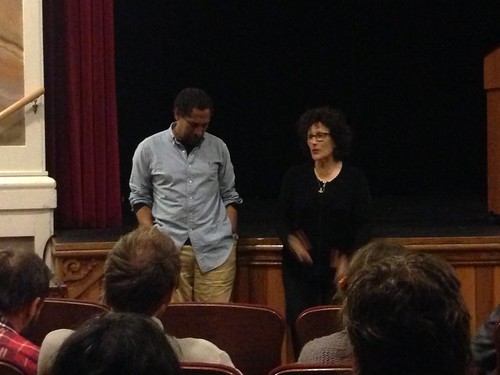
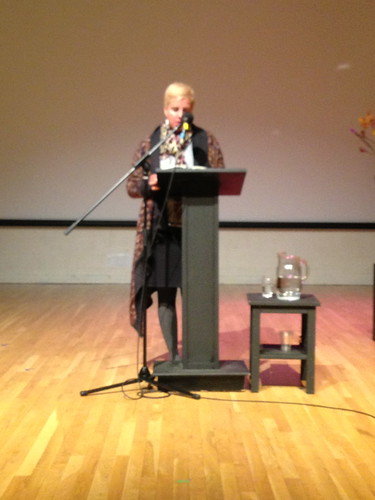
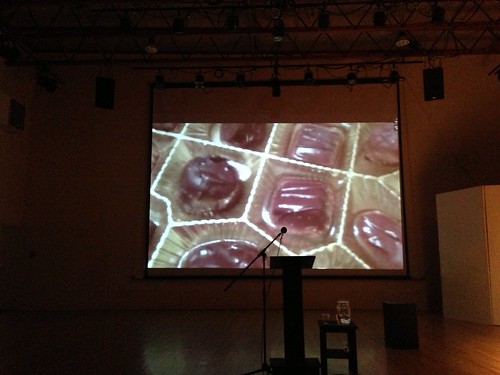
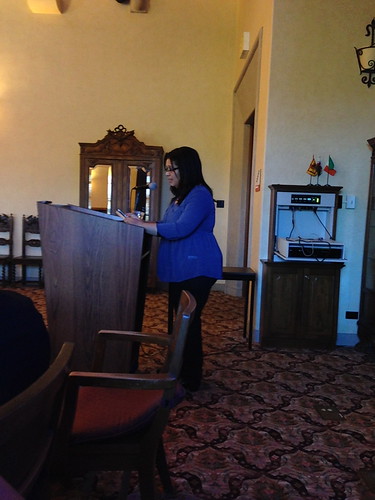
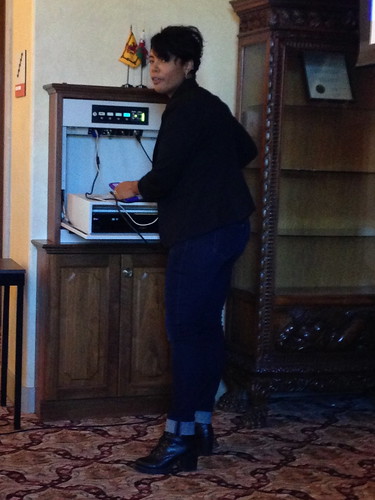
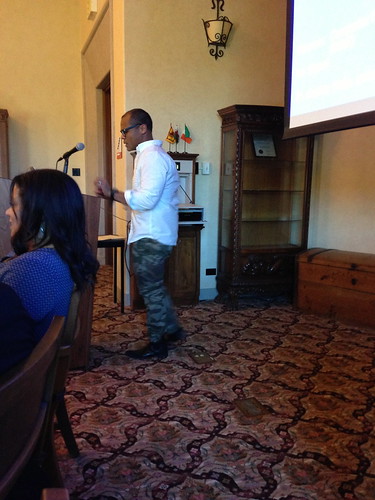
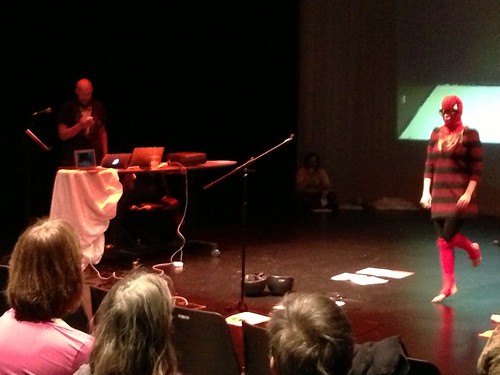
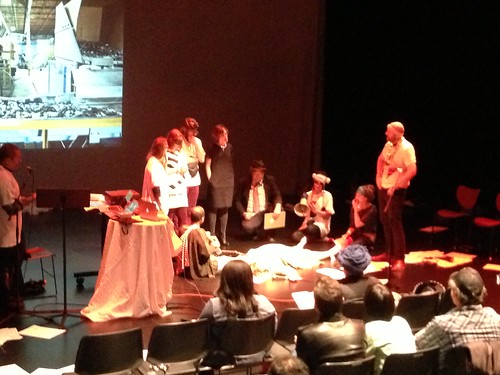

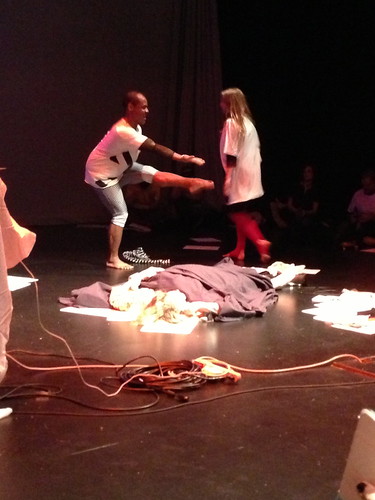
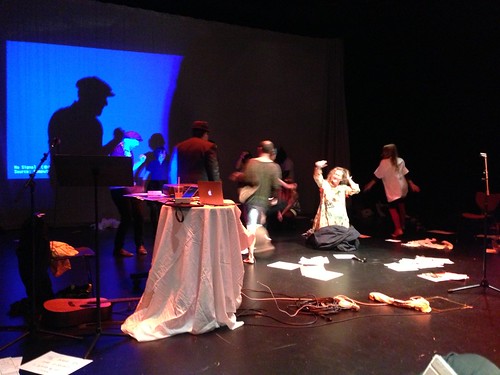
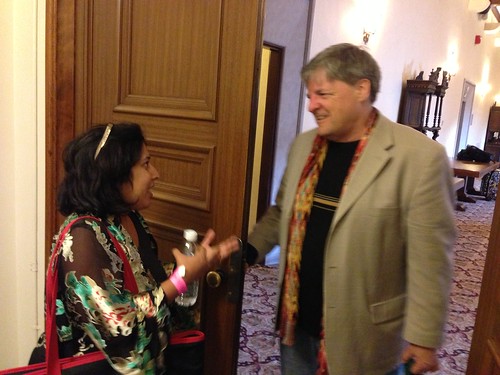
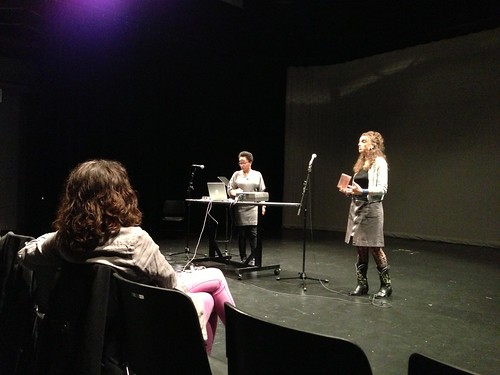
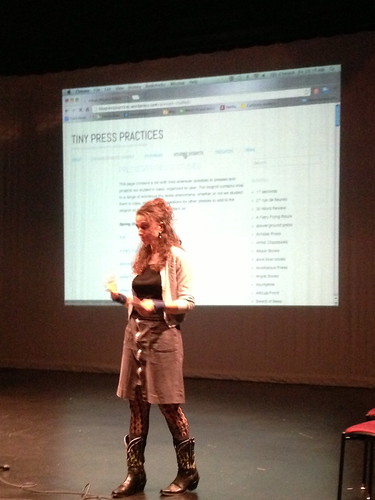
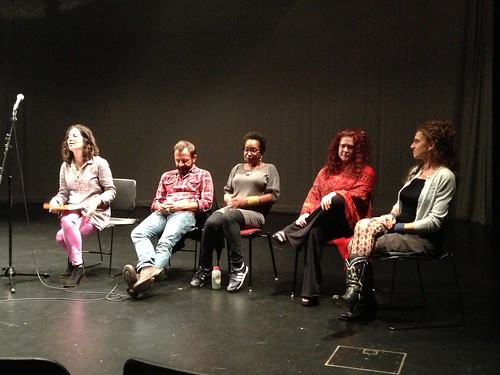
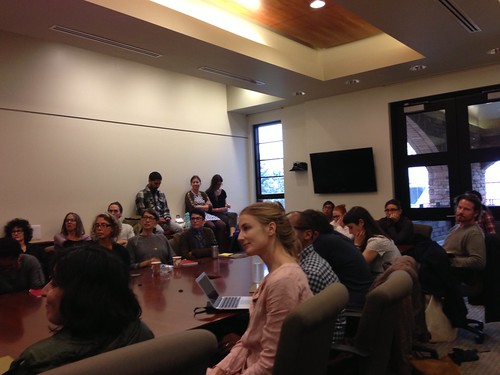
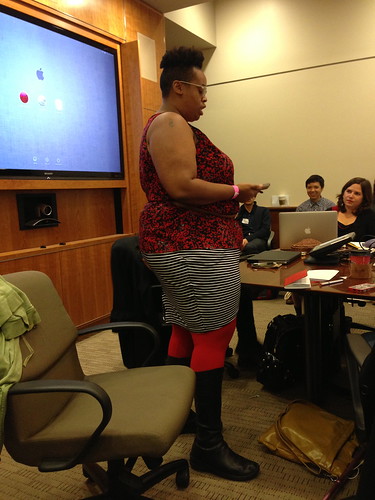
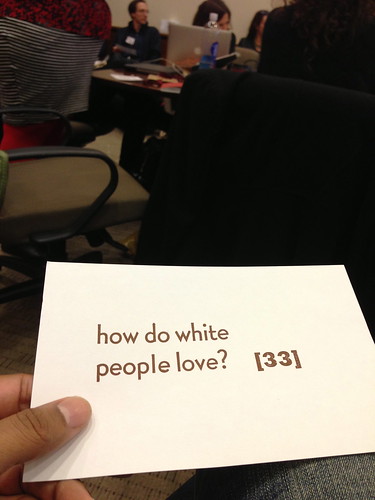
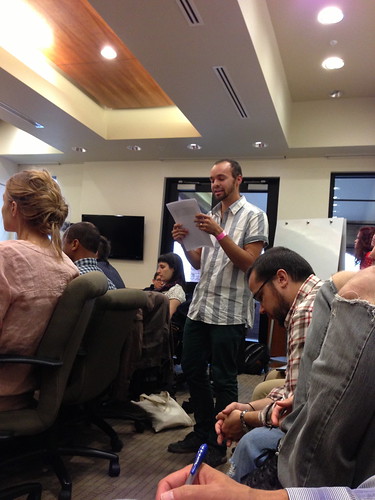
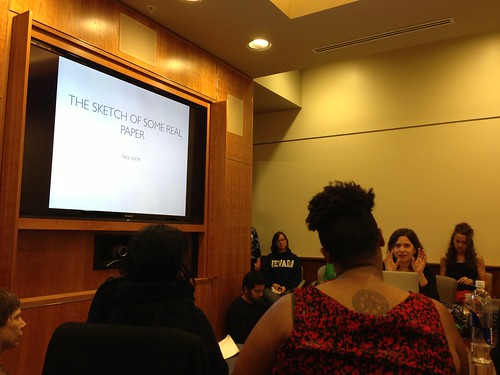
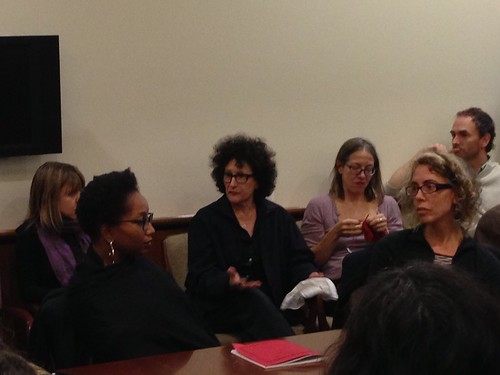
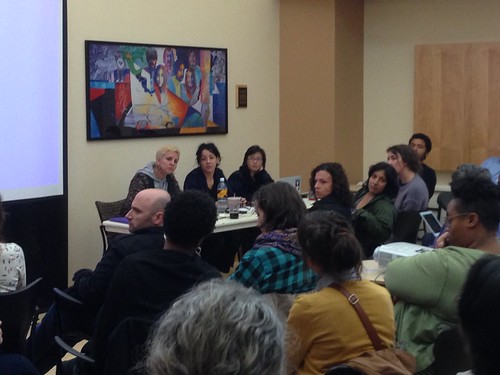











No comments:
Post a Comment